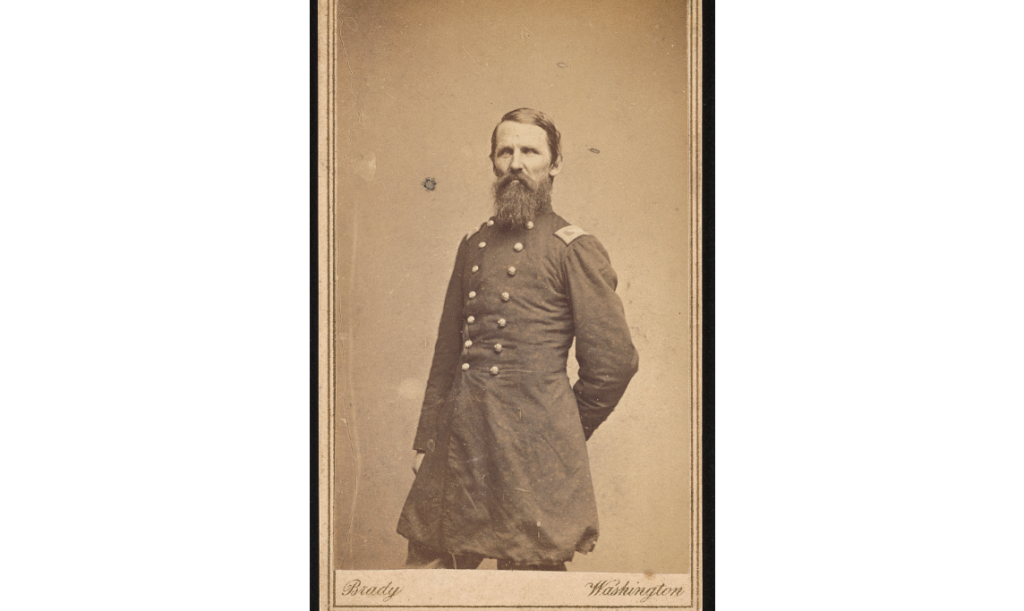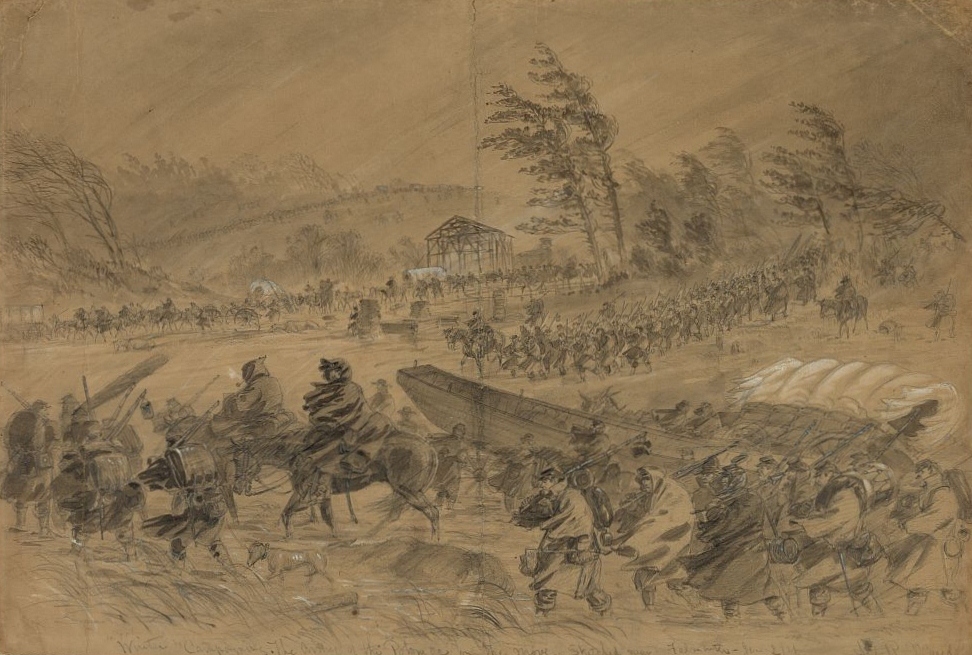Research Arsenal Spotlight 4: Colonel Clark Swett Edwards and the 5th Maine Infantry

This week our spotlight is on the Clark Swett Edwards Collection, a group of 25 letters written by Clark Swett Edwards throughout his service in the 5th Maine Infantry. Clark Swett Edwards helped form the regiment as a captain of company I, before being promoted to Major, then Lieutenant Colonel and Colonel, eventually being awarded the brevet rank of Brigadier General.
Clark Swett Edwards and Company I, 5th Maine Infantry
Clark Swett Edwards was born in 1824 to Enoch and Abigail (McLellan) Edwards. Prior the war he operated several trading businesses in Maine and married Maria Antoinette Mason, to whom he addressed many of his letters in our collection. At the start of the Civil War, Clark Swett Edwards began recruiting a company in his hometown of Bethel, Maine which became known as the “Bethel Rifle Guards.”
The Bethel Rifle Guards were then mustered in as Company I of the 5th Maine Infantry, with Clark Swett Edwards as their captain. Clark Swett Edwards’ brother, Bryce M. Edwards, also served as a private in company I.
Throughout his service, Clark Swett Edwards kept a close eye on the Company I and often lamented its ever dwindling numbers of the original enlisted men.
While his letters to his wife did not discuss the specifics of the many battles in which his regiment fought, he frequently shared with her small anecdotes of camp life, as he did in this letter from August 9, 1861:
“One little circumstance I thought I would write you. It is this. In Company F, a lady by the name of [ Mrs. Albion R.] Stewart came from Lewiston here to see her husband. He stood in his camp door night before last and the first he knew of it, she stood before him. They told me he stood like a ghost for a minute and then she fell into his arms. There were but few dry eyes around the camp for a few minutes. She is here yet. The quartermaster gave up his tent to them and they have it yet. She left Lewiston alone and came on here without his knowing it.”
Clark Swett Edwards as a Field Officer
Clark Swett Edwards was promoted to Major on August 28, 1862 and to Lieutenant Colonel on November 1, 1862. Despite this, he remembered his men from company I and kept a special interest in them. In a letter written December 28, 1862, about a month after his promotion to Lieutenant Colonel, he wrote about the situation of some of the men in company I and the problems with military bureaucracy:
“I will now write you the news of the camp. [Rufus Crockett] Penley of my old company died this morning of consumption here in our camp hospital. He was a fellow I enlisted in Portland when at Camp Preble. The poor fellow sent for me to come and see him a few moments before he breathed his last. He thanked me for my kindness to him while under my command and requested me to see that his folks received the pay due him from government. I took him by the hand and bid him a last farewell. It caused a tear to dim my sight but such is life. I think he has gone to a happier land than this. The poor man should have gone to his home in Portland months ago but this red tape and want of promptness of actions is fatal in many cases. I sometimes feel that great injustice is done to the poor soldiers in holding them when the surgeon knows he will never be of service to the government but it is the same as everything else. There is a lack in almost every department of energy. I have yet some discharged from Co. I since I left it and am making an effort for others which I hope will be successful. I feel sad at heart when I look back on my old company and think of what it once was but few are now in it that once filled its ranks. Some are discharged for disability; others are now sick in hospitals around Washington; some in convalescent camps; while others have gone to their last resting places among the dead. It is anything but pleasant for me to look back and I almost shudder when I look or reflect on the future. But I must drop this and look on the brought side.”
During this same time, Clark Swett Edwards’ brother, Bryce Edwards, was also sick in the hospital. After many months he would be discharged for disability as well.
On January 18, 1863, Clark Swett Edwards was worried about the future battle plans for his regiment and feared that they would be sacrificed in service of General Ambrose Burnside trying to regain ground lost after the Battle of Fredericksburg in December 1862. The offense, known as the “Mud March” was a failure and was General Burnside’s last major action as commander of the Army of the Potomac.

Contributing to the march’s failure was the awful weather, which Clark Swett Edwards detailed in his letter, as well as his determination to do his duty despite his own misgivings:
“Last night it froze hard enough to bear my horse anywhere in the roads so you can judge how it is with the poor soldiers. And still the prospect is a fight soon. We are now under marching orders and I think it must be over the river but I dread the consequence as the army is disheartened. Burnside is bound to cross the river at this place and to retrieve his loss but all the generals are opposed to it so you can judge of our prospect. It is heart sickening, I can assure you. But I shall do my duty regardless of others, or at least I think I will now, but no one can tell till after the fight is over. I feel for others as well as myself. I know if a fight comes off now, that the wounded must suffer greatly, but then I will not borrow trouble as it comes soon enough. The sick of my regiment I sent away this morning to Aquia Creek but as the hospital tents were not ready to receive them, so they only went a mile or so and were sent back. I ordered to send them in the morning again but this moving the sick this cold weather is awful.”
Clark Swett Edwards Hopes for a Star
Towards the end of his service, both Clark Swett Edwards and his wife, Maria, were hopeful that he might receive a promotion to general, despite the long odds against them. The referred to this potential promotion as a “star” in reference to the uniform insignia.
On December 6, 1863, Clark Swett Edwards referenced his wife’s desire to see him promoted:
“ I know you are wishing to see me one peg higher but it will take some political influence to bring that about. But one thing sure, I will never be beholden to anyone at home for a promotion in the army. I know I have done enough to have a star, but there is to many Big men sons in the army for me to rise higher. I still see puff in the eastern papers for myself, some in the Bangor papers [and] also in the Massachusetts papers, but they will do now if I get no more. I presume you see a great many but not all.”
In a letter from January 27, 1864, Edwards was less optimistic:
“You speak of the Star. I am not expecting it. I learn there were six hundred names before Congress at this session and out of that number, five has been appointed—four for Black Regiments and one in the [Regular] Army. There is a great many Colonels whose commission dates from sixty-one while mine dates only back to sixty-three, so you see my prospects is poor. If I should get it, it would be for my exhibiting good conduct.”
Clark Swett Edwards mustered out with most of his regiment on July 27, 1864. The veterans of the regiment who stayed were transferred to the 7th Maine Infantry. On March 13, 1865, Edwards received a brevet promotion to brigadier general for gallantry in action. He died in his hometown of Bethel in 1904.
We’d like to thank William Griffing of Spared & Shared for his tireless work in sharing and transcribing these letters.
To access all of the Clark Swett Edwards Collection as well as thousands of other letters, photos, and other documents, sign up for a Research Arsenal membership here.
Looking for more spotlights on our collection? Check out the story of John L. Hebron of the 2nd Ohio Infantry or the letters of Alfred Washington Ellet, the commander of the US Ram Fleet.

